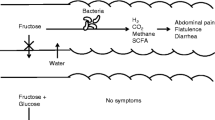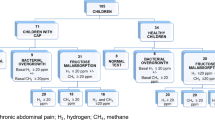Abstract
Fructose malabsorption is linked to gastrointestinal and other unusual symptoms. Polymers of fructose are also recognized prebiotics. While some prebiotics can self-adapt when consumed regularly (resulting in decreased breath hydrogen and symptoms), we wondered whether self-adaptation occurs with basic fructose. We evaluated 90 subjects (61 females). Each completed a diet questionnaire and underwent a fructose challenge. Breath hydrogen and quantified symptom scores were recorded. Group comparisons for sum of breath hydrogen and total symptom scores were evaluated with the Mann-Whitney U test. Spearman’s correlation coefficient and χ2 or Fisher’s exact test were used as appropriate. Malabsorption occurred in 29 patients (32.2%) and low-grade symptoms without malabsorption in 30 (33%). Women complained of symptoms more frequently (p = 0.04) and exhibited more fructose malabsorption (p = 0.0527). Breath hydrogen correlated with symptoms (r = 0.516, p = 0.0037). Adaptation with increasing pretest fructose intake was absent. We conclude that gender may influence fructose malabsorption and there is no adaptation to regular consumption.

Similar content being viewed by others
References
Auricchio S, Rubino A, Landolt M, Semenza G, Prader A (1963) Isolated intestinal lactase deficiency in the adult. Lancet 13:324–326
Scrimshaw NS, Murray EB (1988) The acceptability of milk and milk products in populations with a high prevalence of lactose intolerance. Am J Clin Nutr 48(4 Suppl):1079–1159
Beyer PL, Caviar EM, McCallum RW (2005) Fructose intake at current levels in the United States may cause gastrointestinal distress in normal adults. J Am Diet Assoc 105:1559–1566
Rumessen JJ, Gudmand-Hoyer E (1988) Functional bowel disease: malabsorption and abdominal distress after ingestion of fructose, sorbitol, and fructose-sorbitol mixtures. Gastroenterology 95:694–700
Choi YK, Johlin FC Jr, Summers RW, Jackson M, Rao SS (2003) Fructose intolerance: an under-recognized problem. Am J Gastroenterol 98:1348–1353
Mishkin D, Sablauskas L, Yalovsky M, Mishkin S (1997) Fructose and sorbitol malabsorption in ambulatory patients with functional dyspepsia: comparison with lactose maldigestion/malabsorption. Dig Dis Sci 42:2591–2598
Shi X, Schedl HP, Summers RM, Lambert GP, Chang RT, Xia T, Gisolfi CV (1997) Fructose transport mechanisms in humans. Gastroenterology 113:1171–1179
Skoog SM, Bharucha AE (2004) Dietary fructose and gastrointestinal symptoms: a review. Am J Gastroenterol 99:2046–2050
Davidson NO, Hausman AM, Ifkovits CA, Buse JB, Gould GW, Burant CF, Bell GI (1992) Human intestinal glucose transporter expression and localization of GLUT5. Am J Physiol 262:C795–C800
Ledochowski M, Murr C, Lass-Florl C, Fuchs D (2001) Increased serum amylase and lipase in fructose malabsorbers. Clin Chim Acta 311:119–123
Ledochowski M, Uberall F, Propst T, Fuchs D (1999) Fructose malabsorption is associated with lower plasma folic acid concentrations in middle-aged subjects. Clin Chem 45:2013–2014
Ledochowski M, Widner B, Sperner-Unterweger B, Propst T, Vogel W, Fuchs D (2000) Carbohydrate malabsorption syndromes and early signs of mental depression in females. Dig Dis Sci 45:1255–1259
Gibson GR, Roberfroid MB (1995) Dietary modulation of the human colonic microbiota: Introducing the concept of Prebiotics. J Nutr 125:1401–1412
Schumann C (2002) Medical, nutritional and technological properties of lactulose. An update. Eur J Nutr 41(Suppl 1):I17–I25
Bouhnik Y, Flourie B, D’Agay-Abensour L, Pochart P, Gramet G, Durand M, Rambaud JC (1997) Administration of transgalacto-oligosaccharides increases fecal bifidobacteria and modifies colonic metabolism in healthy humans. J Nutr 127:444–448
Lopez-Molina D, Navarro-Martinez MD, Rojas Melgarejo F, Hiner AN, Chazarra S, Rodriguez-Lopez JN (2005) Molecular properties and prebiotic effect of inulin obtained from artichoke (Cynara scolymus L.). Phytochemistry 66:1476–1484
Roberfroid MB, Van Loo JAE, Gibson GR (1998) The bifidogenic nature of chicory inulin and its hydrolisis products. J Nutr 128:11–19
Franck A (2002) Technological functionality of inulin and oligofructose. Br J Nutr 87(Suppl 2):S287–S291
Szilagyi A (2002) Lactose—a potential prebiotic. Aliment Pharmacol Ther 16:1591–1602
Montgomery EM, Hudson CS (1930) Relations between rotatory power and structure in the sugar group synthesis of a new disaccharide ketose (lactulose) from lactose. J Am Chem Soc 52: 2101–2106
Clausen MR, Mortensen PB (1997) Lactulose, disaccharides and colonic flora. Clinical consequences. Drugs 53:930–942
Habte D, Sterky G, Hjalmarsson B (1973) Lactose malabsorption in Ethiopian children. Acta Paediatr Scand 62:649–654
Sadre M, Karbasi K (1979) Lactose intolerance in Iran. Am J Clin Nutr 32:1948–1954
Villar J, Kestler E, Castillo P, Juarez A, Menendez R, Solomons NW (1988) Improved lactose digestion during pregnancy: a case of physiologic adaptation? Obstet Gynecol 71:697–700
Hertzler SR, Savaiano DA (1996) Colonic adaptation to daily lactose feeding in lactose maldigesters reduces lactose intolerance. Am J Clin Nutr 64:232–236
Szilagyi A, Malolepszy P, Yesovitch S, Nathwani U, Vinokuroff C, Cohen A, Xue X (2005) Inverse dose effect of pretest dietary lactose intake on breath hydrogen results and symptoms in lactase nonpersistent subjects. Dig Dis Sci 50:2178–2182
Stone-Dorshow T, Levitt MD (1987) Gaseous response to ingestion of a poorly absorbed fructo-oligosaccharide sweetener. Am J Clin Nutr 46:61–65
Guarner F (2005) Inulin and oligofructose: impact on intestinal diseases and disorders. Br J Nutr 93(Suppl 1):S61–S65
Cooper GS, Busby MG, Fairchild AP (1995) Measurement of lactose consumption reliability and comparison of two methods. Ann Epidemiol 5:473–477
Kretchmer N (1972) Lactose and lactase. Sci Am 227:71–78
Cramer DW, Xu L (1993) Lactase persistence, galactose meta- bolism, and milk consumption as risk factors for ovarian cancer. In Common Food Intolerances 2: Milk in Human Nutrition and Adult-Type Hypolactasia. Auricchio S, Semenza G (eds), Dyn Nutr Res. Basel: Karger, vol 3, pp 52–60
Sahi T, Isokoski M, Jusila J, Launiala K, Pyorala K (1973) Recessive inheritance of adult-type lactose malabsorption. Lancet 2(7833):823–826
Metz G, Gassull MA, Leeds AR, Blendis LM, Jenkins DJ (1976) A simple method of measuring breath hydrogen in carbohydrate malabsorption by end-expiratory sampling. Clin Sci Mol Med 50:237–240
Van Der Klei-van Moorsel JM, Douwes AC, van Oeveren JP (1984) New principle for estimation of hydrogen in expired air. Eur J Pediatr 141:221–224
Strocchi A, Corazza G, Ellis CJ, Gasbarrini G, Levitt MD (1993) Detection of malabsorption of low doses of carbohydrate: accuracy of various breath H2 criteria. Gastroenterology 105:1404–1410
Barr RG, Watkins JB, Perman JA (1981) Mucosal function and breath hydrogen excretion: comparative studies in the clinical evaluation of children with non-specific abdominal complaints. Pediatrics 68:526–532
Born P, Zech J, Stark M, Classen M, Lorenz R (1994) Carbohydrate substitutes: Comparative study of intestinal absorption of fructose, sorbitol and xylitol. Med Klin 89:575–578
Ledochowski M, Widner B, Murr C, Sperner-Unterweger B, Fuchs D (2001) Fructose malabsorption is associated with decreased plasma tryptophan. Scand J Gastroenterol 36:367–371
Szilagyi A, Salomon R, Martin M, Fokieff K, Seidman E (1996) Improved lactose handling in late phase pregnancy. Clin Invest Med 19:416–426
Szilagyi A, Rivard J, Fokeeff K (2001) Improved parameters of lactose maldigestion using lactulose. Dig Dis Sci 46:1509–1519
Ladas S, Papanikos J, Arapakis G (1982) Lactose malabsorption in Greek adults: correlation of small bowel transit time with the severity of lactose intolerance. Gut 23:968–973
Rumessen JJ, Gudmand-Hoyer E (1998) Fructans of chicory: intestinal transport and fermentation of different chain lengths and relation to fructose and sorbitol malabsorption. Am J Clin Nutr 68:357–364
Corazza GR, Benati G, Strocchi A, Malservisi S, Gasbarrini G (1994) The possible role of breath methane measurement in detecting carbohydrate malabsorption. J Lab Clin Med 124:695–700
Jiang T, Savaiano DA (1997) In vitro lactose fermentation by human colonic bacteria is modified by Lactobacillus acidophilus supplementation. J Nutr 127:1489–1495
Jiang T, Savaiano DA (1997) Modification of colonic fermentation by bifidobacteria and pH in vitro. Impact on lactose metabolism, short-chain fatty acid, and lactate production. Dig Dis Sci 42:2370–2377
Ito M, Kimura M (1993) Influence of lactose on faecal microflora in lactose maldigesters. Microb Ecol Health Dis 6:73–76
Briet F, Pochart P, Marteau P, Flourie B, Arrigoni E, Rambaud JC (1997) Improved clinical tolerance to chronic lactose ingestion in subjects with lactose intolerance: a placebo effect? Gut 41:632–635
Flourie B, Briet F, Florent C, Pellier P, Maurel M, Rambaud JC (1993) Can diarrhea induced by lactulose be reduced by prolonged ingestion of lactulose? Am J Clin Nutr 58:369–375
Bouhnik Y, Attar A, Joly FA, Riottot M, Dyard F, Flourie B (2004) Lactulose ingestion increases faecal bifidobacterial counts: A randomizsed double-blind study in healthy humans. Eur J Clin Nutr 58:462–466
Bouhnik Y, Raskine L, Simoneau G, Paineau D, Bornet F (2006) The capacity of short-chain fructo-oligosaccharides to stimulate faecal bifidobacteria: a dose—response relationship study in healthy humans. Nutr J 5:8
Tannock GW, Munro K, Bibiloni R, Simon MA, Hargreaves P, Gopal P, Harmsen H, Welling G (2004) Impact of consumption of oligosaccharide-containing biscuits on the fecal microbiota of humans. Appl Environ Microbiol 70:2129–2136
Yesovitch R, Cohen A, Szilagyi A (2004) Failure to improve parameters of lactose maldigestion using the multiprobiotic product VSL3 in lactose maldigesters: a pilot study. Can J Gastroenterol 18:83–86
Hove H, Norgaad-Andersen I, Mortensen PB (1994) Effect of lactic acid bacteria on the intestinal production of lactate and short-chain fatty acids and the absorption of lactose. Am J Clin Nutr 59:74–79
Saltzman JR, Russel RM, Golner B Barakat S, Dallal GE, Goldin BR (1999) A randomized trial of Lactobacillus acidophilus BG2FO4 to treat lactose intolerance. Am J Clin Nutr 69:140–146
Acknowledgments
The authors thank the expert secretarial and administrative services of Mr Albert Redman.
Author information
Authors and Affiliations
Corresponding author
Rights and permissions
About this article
Cite this article
Szilagyi, A., Malolepszy, P., Yesovitch, S. et al. Fructose Malabsorption May Be Gender Dependent and Fails to Show Compensation by Colonic Adaptation. Dig Dis Sci 52, 2999–3004 (2007). https://doi.org/10.1007/s10620-006-9652-9
Received:
Accepted:
Published:
Issue Date:
DOI: https://doi.org/10.1007/s10620-006-9652-9




